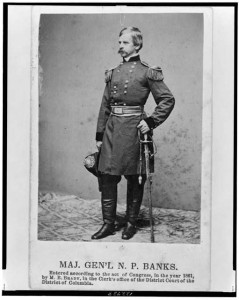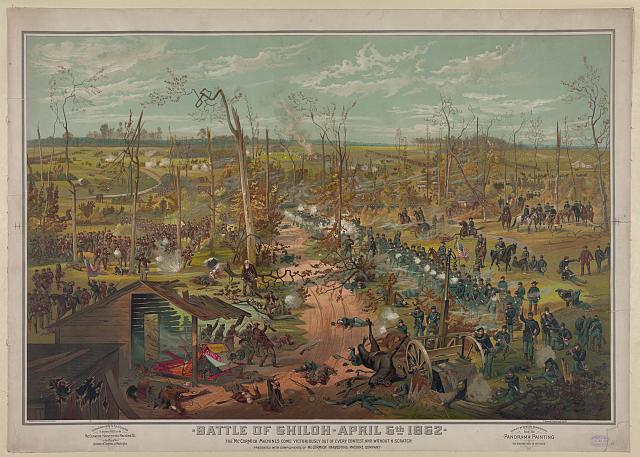150 years ago today a Richmond newspaper printed a document issued by Nathaniel Banks, commander of the Department of the Gulf, explaining the effect of President Lincoln’s Emancipation Proclamation on the people of Louisiana.
From the Richmond Daily Dispatch January 9, 1863:
Gen. Banks’s emancipation proclamation in New Orleans.
General Banks gave New Orleans a Christmas sensation in the way of an emancipation proclamation, after the style of Abraham 1st. The following is the document:
Headq’s Department of the Gulf.
New Orleans, Dec. 24, 1862.
To the People of Louisiana:
In order to correct public misapprehension and misrepresentation, for the instruction of the troops of this department, and the information of all parties in interest, official publication is herewith made of the proclamation by the President of the United States relating to the subject of the emancipation. In the examination of this document it will be observed:
I. That it is the declaration of a purpose only — the full execution of which is contingent upon an official designation by the President, to be made on the 1st day of January next, of the States and parts of States, if any, which are to be affected by its provisions.
II. That the fact that any State is represented in good faith in the Congress of the United States is conclusive evidence, in the absence of strong countervailing testimony, that such State, and the people thereof, are not in rebellion against the United States.
III. That the State of Louisiana has not yet been designated by the President as in rebellion, nor any part thereof, and that it has complied with all the conditions of the proclamation respecting representation.
IV. That pecuniary aid to States not in rebellion, which may hereafter provide for immediate or gradual emancipation; the colonization of persons of African descent elsewhere, and the compensation of all citizens who have remained loyal, “for all losses by acts of the United States, including slaves,” are among the chief recommendations of this important paper.
It is manifest that the changes suggested therein and which may hereafter be established, do not take effect within this State on the first of January proximo, nor at any precise period which can now be designated, and I call upon all persons, of whatever estate, condition, or degree, soldiers, citizens or slaves, to observe this material and important fact, and to govern themselves accordingly. All unusual public demonstrations, of whatever character, will be for the present suspended. Provost marshals, officers, and soldiers, are enjoined to prevent any disturbance of the public peace. The slaves are advised to remain upon their plantations until their privileges shall have been definitely established. They may rest assured that whatever benefit the Government intends will be secured to them; but no man can be allowed in the present condition of affairs to take the law into his own hands. If they seek the protection of the Government they should wait its pleasure. Officers invested with command will be vigilant in the discharge of their duties. …
The war is not waged by the Government for the overthrow of slavery. …
The first gun at Sumter proclaimed emancipation. The continuance of the contest, there commenced, will consummate that end, and the history of the age will leave no other permanent trace of the rebellion. Its leaders will have accomplished what other men could not have done. The boldest Abolitionist is a cy[p]her when compared with the leaders of the rebellion. What mystery pervades the works of Providence! We submit to its decrees, but stand confounded at the awful manifestations of its wisdom and power! The great problem of the age, apparently environed with labyrinthine complications, is likely to be suddenly lifted out of human hands. We may control the incidents of the contest, but we cannot circumvent or defeat the end. It will be left us only to assuage the horrors of internecine conflict …
Contest, in public as in social life, strengthens and consolidates brotherly affection. [E]gland, France, Austria, Italy–every land fertile enough to make a history, has had its desolating civil wars. It is a baseless nationality that has not tested its strength against domestic enemies.–The success of local interests narrows the destiny of a people, and is, followed by accession, poverty, and degradation. A divided country and perpetual war make possession a delusion and life a calamity. The triumph of national interests widens the scope of human history, and is attended with peace, prosperity, and power. It is out of such contests that great nations are born. What hallowed memories float around us! New Orleans is enshrined as sacred as Bunker Hill! On the Arostook and the Oregon the names of Washington, Jackson, and Taylor are breathed with as deep a reverence as on the James or the Mississippi. Let us fulfill the condition of this last great trial, and become a nation — a grand nation — with sense enough to govern ourselves and strength enough to stand against the world united.
N. P. Banks,
Major General Commanding.


![Bombardment of Fort Sumter, Charleston Harbor: 12th & 13th of April, 1861 (Currier & Ives, [1861?]; LOC: LC-DIG-ppmsca-19520)](https://www.bluegrayreview.com/wp-content/uploads/2013/01/19520r-300x213.jpg)
